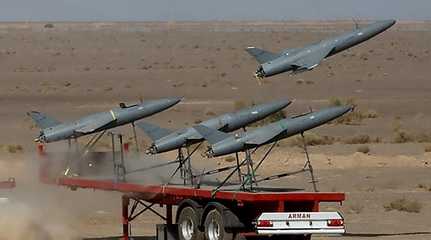
14 October 2022; MEMO: European foreign ministers will, on Monday, discuss the transfer of Iranian drones to Russia and could come to a political agreement on future sanctions related to such activity, two diplomats said on Friday, Reuters reports.
Ukraine has reported a spate of Russian attacks using Iranian-made Shahed-136 drones in recent weeks. Iran denies supplying the drones to Russia, while the Kremlin has not commented.
Three drones operated by Russian forces attacked the small town of Makariv, west of Ukraine's capital, early on Thursday, with officials saying that critical infrastructure facilities were struck by what they said were Iranian-made "suicide drones".
According to the diplomats citing preparatory meetings ahead of Monday's ministerial meeting in Luxembourg, an analysis of the drone activity has been carried out with the topic now on the agenda.
The diplomats said, although an agreement on new listings was not possible on Monday, there could be a political agreement that would pave the way for sanctions at a later stage.
The bloc is already set to impose, on Monday, travel bans and asset freezes on some 15 Iranians involved in the crackdown that began last month on demonstrations that followed the death in police custody of 22-year-old Mahsa Amini.
France and Germany, both parties to the 2015 nuclear deal with Iran, have made it clear they believed new sanctions in connection to the drones used by Russia were also necessary, and that the drone transfers should be seen as a violation of Resolution United Nations Security Council 2231.
Resolution 2231 endorsed the 2015 nuclear deal between Iran and six powers – Britain, China, France, Germany, Russia and the United States – that limited Tehran's uranium enrichment activity, making it harder for Iran to develop nuclear arms while lifting international sanctions.
An EU spokesperson said foreign ministers would discuss Iran on Monday, but declined to comment on whether Iranian drones or sanctions on drone transfers would be on the agenda.
"It will be examined, but the sanctions won't happen now," said one of the diplomats.
READ: Ukraine claims it shot down Iran drone used by Russia
France's Foreign Ministry said on Thursday it would consult with its EU partners on how to respond to the drone activity and, for the first time, linked Iran's potential supplies with the UN Security Council resolution, saying such activity was a violation of it.
Under the Resolution, an arms embargo on Iran was in place until October 2020. Despite US efforts under former President Donald Trump, who took the United States out of the deal in 2018, to extend the arms embargo, the Security Council rejected this, paving the way for Iran to resume arms' exports.
However, the Resolution still includes restrictions on missiles and related technologies that last until October 2023, and that encompasses the export and purchase of advanced military systems.
Human Rights Sanctions, Iranian Demarche
A diplomatic source said the drones in question fell under the Missile Technology Control Regime (MTCR), an informal political understanding among some 35 States that seeks to limit the proliferation of missiles and missile technology, sales of which would violate the Resolution. The Resolution makes no mention of the MTCR and Iran is not party to it.
The United States on 9 September imposed sanctions on an Iranian company it accused of coordinating military flights to transport Iranian drones to Russia and three other companies it said were involved in the production of Iranian drones.
The discussion on drones comes as EU foreign ministers prepare to rubber-stamp sanctions on Iran on Monday over human rights abuses involved in the crackdown on protesters.
European diplomats say the package, already agreed among EU envoys, involves some 15 people and entities, covering asset freezes and travel bans and follows similar sanctions by the United States, Canada and Britain.
The package of sanctions prompted Iran to send a diplomatic demarche to European ambassadors. Diplomats who saw it said that, in the demarche, Iran said it was surprised by the EU reaction to the crackdown and by what it called the false narrative of events and warned of harming ties with Tehran.
The demarche referred to casualties among Iranian security forces and repeated a government claim that 22-year-old Mahsa Amini, who died in police custody, triggering the almost month-long protests, had died because of illness.
It said external factors were the cause of the protests and said demonstrators were controlled by foreign entities.
"We made clear they should think about what's happening internally and they can't expect the EU to stay silent in the face of these mass human rights violations," one of the diplomats said.




